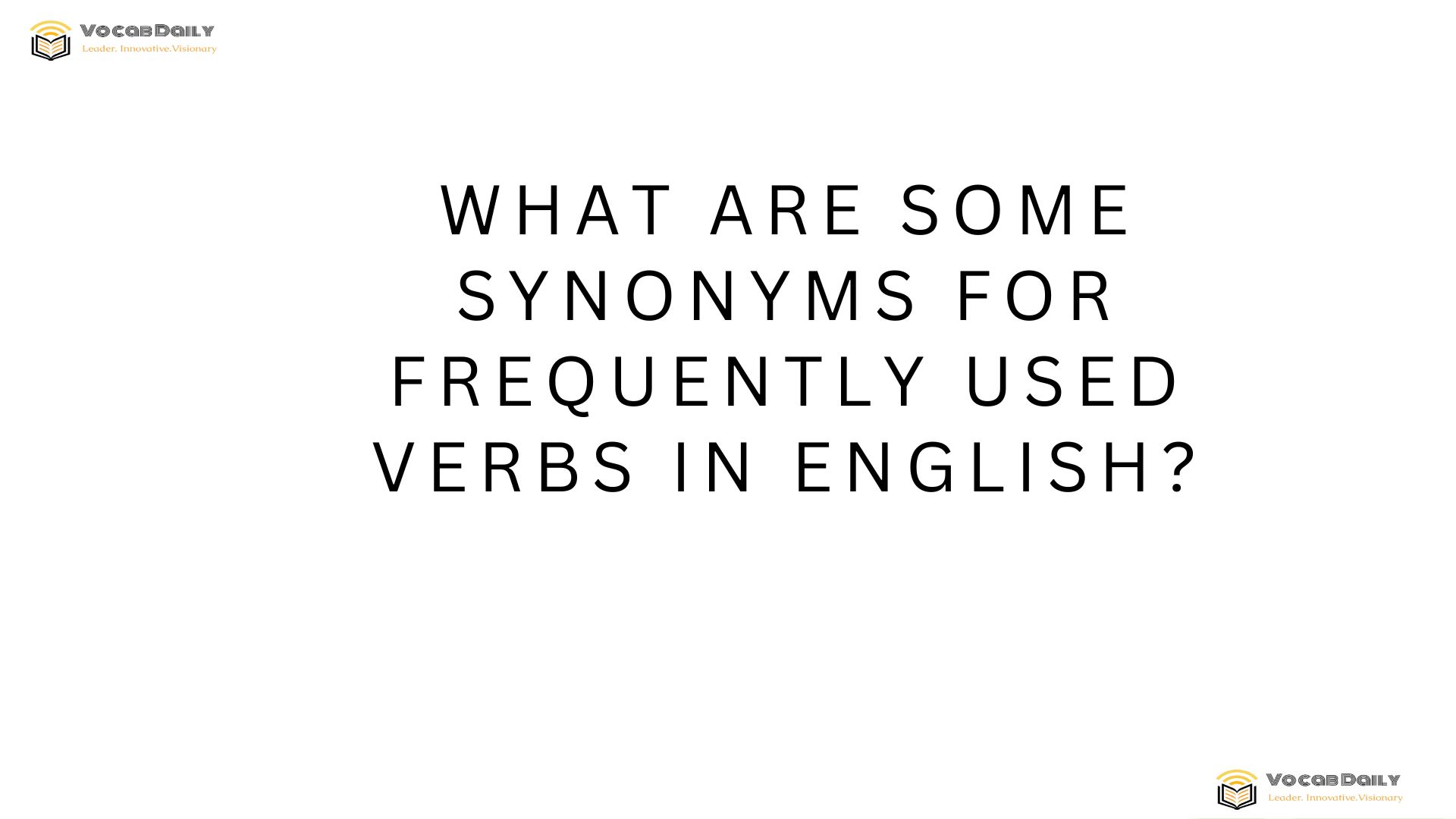Understanding Commonly Used Verbs
Verbs are the backbone of any sentence, showing action, occurrence, or a state of being. In English, some verbs are used so frequently that they become essential to communication. However, constantly repeating these common verbs can make writing and speech sound monotonous or uninteresting. Using synonyms for frequently used verbs not only enhances clarity but also brings variety and richness to your language.
This article explores several commonly used verbs in English and provides a range of suitable synonyms for each. Whether you are writing an essay, preparing a presentation, or simply improving your vocabulary, knowing alternatives for everyday verbs can be invaluable.
Synonyms for the Verb “Do”
The verb “do” is one of the most frequently used verbs in English. It generally means to perform an action or carry out a task. Here are some alternatives depending on the context:
- Perform
- Execute
- Carry out
- Accomplish
- Complete
- Undertake
- Act
- Work on
For example, instead of saying “I will do my homework,” you might say “I will complete my homework” or “I will work on my homework.”
Synonyms for the Verb “Make”
“Make” often means to create or produce something. It can also mean to compel or cause. To avoid repetition and add precision, consider these synonyms:
- Create
- Construct
- Build
- Produce
- Generate
- Form
- Fabricate
- Assemble
- Cause
- Induce
For example, “She makes a beautiful cake” can be rephrased as “She creates a beautiful cake” or “She bakes a beautiful cake,” depending on the context.
Synonyms for the Verb “Go”
The verb “go” expresses movement from one place to another. Here are various synonyms that may better fit specific contexts:
- Travel
- Move
- Proceed
- Depart
- Advance
- Leave
- Pass
- Journey
For example, instead of “I go to school,” you could say “I travel to school” or “I head to school.”
Synonyms for the Verb “Say”
“Say” is a versatile verb commonly used for expressing speech or thoughts. Depending on the tone and situation, these synonyms can add more clarity or color:
- Speak
- Tell
- State
- Express
- Declare
- Announce
- Remark
- Mention
- Assert
Rather than “He said he was tired,” you might say “He stated that he was tired,” or “He mentioned that he was tired.”
Synonyms for the Verb “Get”
The verb “get” has many meanings including obtain, become, or receive. Here are synonyms that fit well in different scenarios:
- Obtain
- Receive
- Acquire
- Gain
- Become
- Fetch
- Secure
- Accept
For example, “I got a gift” can be changed to “I received a gift” or “I acquired a gift.”
Synonyms for the Verb “See”
“See” commonly refers to perceiving with the eyes, but it can also mean understanding or meeting someone. Here are alternatives:
- Observe
- Watch
- Notice
- View
- Spot
- Witness
- Meet
- Perceive
Instead of “I see the bird,” try “I observe the bird” or “I notice the bird.”
Synonyms for the Verb “Take”
“Take” is used to describe grabbing, accepting, or consuming something. Its synonyms include:
- Grab
- Seize
- Collect
- Acquire
- Accept
- Receive
- Pick up
- Remove
For example, instead of “Please take the book,” you can say “Please pick up the book,” or “Please grab the book.”
Synonyms for the Verb “Know”
“Know” indicates awareness, familiarity, or understanding. Here are some useful synonyms:
- Understand
- Recognize
- Realize
- Comprehend
- Perceive
- Become aware of
For example, “I know the answer” can be rephrased as “I understand the answer” or “I recognize the answer.”
Synonyms for the Verb “Think”
“Think” relates to mental processes such as considering, believing, or reasoning. Synonyms to choose from include:
- Consider
- Believe
- Reflect
- Suppose
- Contemplate
- Reason
- Imagine
Replacing “I think it’s right” with “I believe it’s right” or “I suppose it’s right” can better express the degree of certainty.
Synonyms for the Verb “Use”
The verb “use” is often applied when talking about employing tools, skills, or methods. Consider the following alternatives:
- Employ
- Utilize
- Apply
- Expend
- Operate
- Take advantage of
For example, instead of “I use a computer,” you could say “I operate a computer” or “I utilize a computer.”
Choosing the Right Synonym
While synonyms can enhance language variety, it’s important to choose a word that fits the exact context and tone. Some synonyms carry formal or informal nuances, while others suggest a slightly different meaning. Always consider how the verb impacts the sentence and the message you want to deliver.
For English learners and writers alike, building a strong vocabulary with varied verbs can significantly improve both written and spoken communication. Reading widely and practicing writing with different synonyms can solidify this knowledge in everyday use.
Expand your vocabulary to master the art of expression, and you will notice how your communication skills evolve to be more engaging and precise.
Also check out VocabDaily workbook collections.

Leave a Reply